Moto adventures in rural Cambodia; or, talking to witnesses in a village.
The ferry creaks and moans under the weight of its cargo for thirty minutes, but the threat to sink turns out to be an empty one. Upon reaching the far side of the Mekong River from Stung Treng City, Poa and the rest of the motorists fly up the mud embankment like bats out of hell. I trudge up the hill with a few other pedestrians and join Poa at the top. Our client's son greets us, and we begin our hour-long moto ride to our client's village. We are here to meet with witnesses to listen to their testimony and to persuade them to testify at our client's trial.
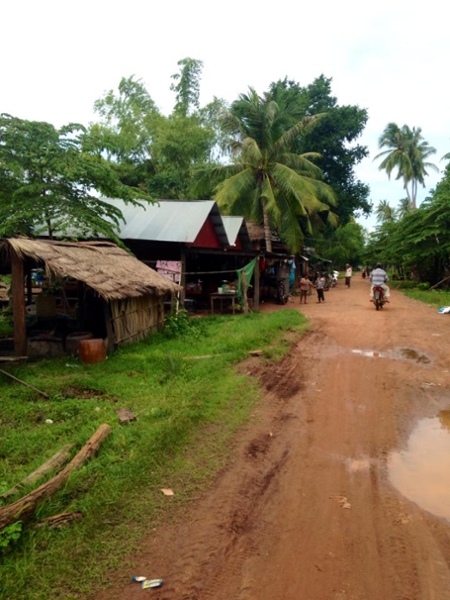
The dry season has been shifting into the rainy season in spurts, and as a result all of the unsealed dirt roads have become muddy rivers pocked with trench marks and potholes. Poa sometimes has to use his feet to walk the moto through some particularly boggy stretches. I am glad that all I have to do is keep still on the back. The road runs parallel to the river on the left and sometimes I catch glimpses of water through palm trees and shrubs. The other side of the road is lined with wooden shacks on stilts, rice paddies, and water buffalo. Cows and dogs stand in the road and we honk at them to move out of the way. People walking in the road or working in the paddies stand up and stare in wide-eyed wonder when they notice me.
Short wooden bridges crossing over streams are very rickety. Momentum repeatedly slams me into Poa's back whenever he slows down suddenly to ease over the bumps. This continues for about forty-five minutes before we reach one little delta that doesn't have a bridge. Instead, one has to cross on a raft that is dragged back and forth on a rope hanging over the water. The operator wears a fanny pack tucked up underneath an impressive pot belly. His shirt is pulled up so that his stomach is naked and he absent-mindedly rubs it. This is a common habit of many Cambodian men. While he tugs on the rope, he looks me up and down and gestures at me with his head while talking to Poa. I hear Poa say ''A-may-rit'' (America), so I know they are talking about me. The raft's fee is 1,000 riel (about 25₵). The man reminds me of the bridge troll from Three Billy Goat's Gruff.
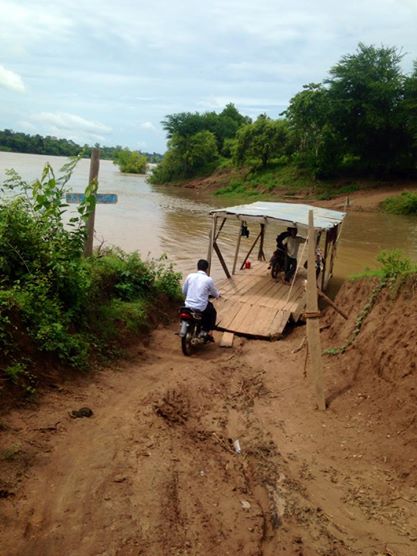
After driving a little while longer on the red mud road, we stop in front of our client's house and he joins our little moto party on his own moto. I amuse myself by pretending we are a biker gang like in Sons of Anarchy. The client's case is related to a land dispute with his neighbor. Both families are in this village because the Vietnamese soldiers who freed them from a Khmer Rouge forced labor camp dropped them off here, like most of the non-indigenous people in this commune (commune = a collection of villages). Our client says he is 60 years old now so that means he was 25 years old at the time. Many of the witnesses we have in cases such as this are very old. Whenever I meet them I always wonder if they were laborers or soldiers during the Khmer Rouge's rule, and, if they were soldiers, if they did so because it was what they wanted or because they felt coerced.
We first visit the home of the man who was commune chief from 1979 to 1993. While Poa and our client talk to him in Khmer, I smile at the other people staring at me. I assume they are his family. They are sitting on wooden platforms underneath the front porch, which is supported by tall wooden stilts. There are a lot of rusty farm machines. I smile and say ''soo-suh-dai'' (hello). They laugh to each other. I watch a little puppy sniffing an empty bag of rice. "Gun ch'guy!'' (puppy!) I exclaim. They laugh even harder and smile at me. Poa tells me he has agreed to testify on our client's behalf at the trial. I only ask a few simple questions because Poa seems to be in a rush. When we leave I say ''lea-son-high-ee!'' (goodbye!).
Next, the 4 of us park in front of a lot and walk through a wooden frame that might become a house one day. Behind it, several men are playing cards inside what looks like a chicken coop. One of the men crawls out and puts pants on over his briefs, puts on a shirt, and sits down with us at a small, narrow table. He's the current chief of the commune. During our conversation, I notice that a small pack of children keeps growing and creeping closer to me. They gawk at me. I must be the first foreigner they've ever seen. I smile and wave. Their faces remain blank. Waving is a Western gesture so they don't know I'm trying to be friendly. The commune chief agrees to testify for our client, so we thank him and leave.
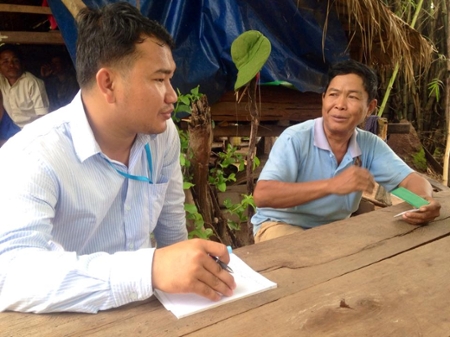
Our client now leads us to the home of his friend, who's only relation to the case is that he and his parents were also dropped off in this village by Vietnamese soldiers after the Khmer Rouge regime. He is squinting through glasses and repairing a fish net when we walk up the stairs to see him. The home is a wooden house on stilts, and inside I see a wooden bed frame without a mattress, a hammock, a small old television and a spirit altar. Poa and our client talk to the man talk for a while, but I get the feeling that Poa is not very happy because there's a long pause in the conversation. Poa translates my questions in order to ease the tension. We leave shortly afterward. He tells me outside that the man says he does not want to testify because he wants to maintain a good relationship with our client's neighbor.
The land in dispute is bordered by a farm owned by a third neighbor. The third neighbor agrees to meet us at our client's house. We park our motos and then walk on a long skinny log across a small ravine to reach our client's home. Up over the other embankment, I am surprised to see several buildings in a little compound. Apparently our client has a large family. Under the largest wooden house on stilts, several people are lounging in hammocks and on wooden platforms. One woman squats over a small gas stove. A small field of corn grows right up to the home. The neighbor and a very old woman arrive before too long. I wonder how she crossed the wooden bridge, because the man is helping her walk. We sit with the man and talk to him for a while, and he agrees to testify at the trial if he has nothing better to do that day. During the talk, the old woman looks at me out of the corner of her eye. I smile, and she smiles back. The man and the old woman leave.
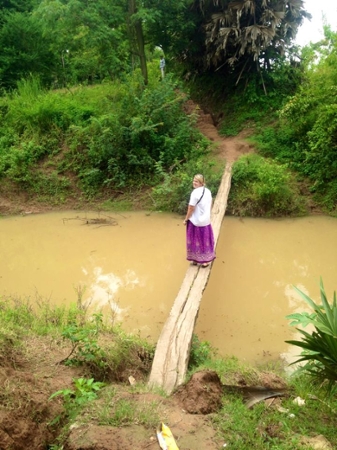
Poa declines an invitation to stay for lunch because he is worried that the water won't be safe for us to drink. We cross the little wooden log again and follow the client and his son by moto to the back part of the property to see the area in dispute. After taking some pictures and observing the remnants of the fence the neighbor built that our client tore down, Poa asks the client's son to escort us back to the main ferry. He tells me that he is worried about everyone staring at me because he saw some ''not good people'' when we drove in and we ''don't have friends here.'' I get the feeling he's worried about rape or being mugged, but I am just hoping the moto doesn't crash!
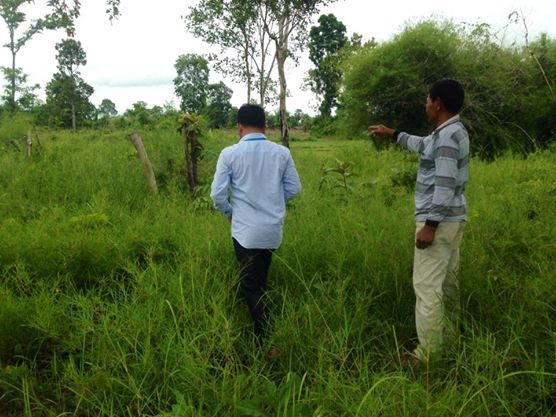
The journey from this village to Stung Treng City is going to be even more arduous when the rainy season is in full swing. I am slightly skeptical that the witnesses will show up to the trial. The roads are very treacherous, and gas isn't free. However, I hope they make the effort for our client's sake. I'm curious about what happens during a medical emergency in places like this. Access to emergency medical care must be nearly impossible to get. While sitting in all of the client interviews, I kept realizing how bizarre the legal system must be to the villagers. ''Justice'' as an abstract ideal probably sounds like a fairytale. And yet, the laws of the country do apply to them and there can be serious consequences to the villagers for breaking them. I am glad that I'm working for an organization that provides legal aid to people all the way out here.